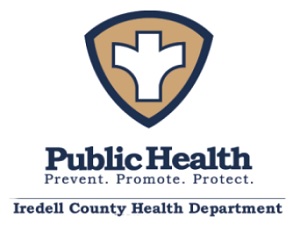
Special to Iredell Free News
With the recent increase in the rate of positive COVID-19 test results, Iredell County health officials are urging residents to take necessary precautions to protect themselves and others from infection.
The county’s positive rate is now 10 percent, up sharply from 6 percent in June, according to the Iredell County Health Department. While more people are being tested, the increase in the positive rate is a clear indication there is an overall rise in community spread of COVID-19, officials said in a news release.
Although some people report merely losing a sense of taste and smell as the worst of his or her COVID-19 experience, others with serious health conditions and those over age 65 are at a much higher risk of very severe illness and even death from this virus.
There have been 18 deaths attributed to COVID-19 in Iredell County, including nine in July.
An estimated 51.1% of adults in North Carolina are at higher risk for severe illness from COVID-19 based on being 65 or older, having at least one of the underlying health conditions, or both. This an alarming because over half of the adults in North Carolina could suffer severe complications from COVID-19, health officials said.
While many exhibit symptoms when infected with COVID-19, there are some individuals who are asymptomatic, meaning they show no symptoms of the virus at all.
Recently, the CDC changed isolation guidance to state that isolation can discontinue 10 days after symptom onset and resolution of fever for at least 24 hours (versus the earlier 72 hours), without the use of fever-reducing medication and improvement of other symptoms for those who are symptomatic, or 10 days after first positive COVID-19 test for asymptomatic individuals.
It is also now not recommended that individuals be re-tested for COVID-19 nor be required to produce a negative result in order to discontinue isolation. Retesting is not recommended within three months after the date of symptom onset for persons previously diagnosed with symptomatic COVID-19, who remain asymptomatic after recovery. If a previously infected individual is exposed to COVID-19 later than three months of their infection, they will be required to quarantine at home for 14 days.
Heath officials are urging the community to continue personal prevention practices such as handwashing, wearing a cloth face covering, maintaining six feet of distance, staying home when you are sick, and regularly cleaning and disinfecting. These are all important ways to prevent the virus’s spread.
COVID-19 is believed to be mostly spread by respiratory droplets released when people talk, cough, or sneeze. It is thought that the virus may also spread to hands from contaminated surfaces then to the nose, mouth or eyes, causing infection.
As a reminder, indoor gatherings of more than 10 people and outdoor gatherings in an enclosed environment of more than 25 people are prohibited, with the continuation of Phase 2, by the authority of Gov. Roy Cooper’s Executive Order 147. The more people an individual interacts with at a gathering and the longer that interaction lasts, the higher the potential risk of becoming infected with COVID-19.
Since Iredell County is currently experiencing a higher community transmission rate of COVID-19, there is a higher risk of COVID-19 spreading during local gatherings.
Before attending or hosting a final farewell to summer party, please refer to the Centers for Disease Control and Prevention (CDC) Considerations for Events and Gatherings. This document provides great guidance related to reducing the spread of COVID-19, maintaining healthy environments, maintaining healthy operations, and preparing for when someone gets sick.
Iredell County Public Health Officials continue to encourage individuals to protect themselves to help lessen the spread of COVID-19. How to protect yourself and others:
• Practice social distancing, which means avoiding gatherings of more than 10 people and keeping six feet or more between yourself and others.
• Wear cloth mask or face covering when out in public where you may be around people, like grocery stores or pharmacies. There are exceptions to this requirement related to medical or behavioral conditions. You should still try to practice social distancing even if wearing a cloth face covering.
• Frequent hand washing with soap and water for at least 20 seconds, especially after going to the bathroom, before eating, and after blowing your nose, coughing or sneezing.
• If soap and water are not readily available, use an alcohol-based hand sanitizer with at least 60 percent alcohol.
• Cover your cough or sneeze with a tissue, then throw it in the trash.
• Stay home when you’re sick.
• Keep distance from others who are sick.
• Avoid touching your face.
• Clean and disinfect high touch surfaces in common areas like doorknobs, remotes, light switches, tables and handles.




Businesses need to do their part and follow guidelines for being open. If they aren’t following guidelines, avoid them.